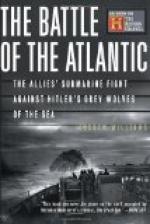“Overboard, or dead? You found them dead—the slaves also?”
“No; there were no slaves; the hold was clear. We found a few dead men, the last of the crew to survive. One man was lying beside the wheel; he had lashed it to its course before he died; and the Captain was in the cabin.”
“And he was dead?”
“Yes, a tall, lean Spaniard; Sam said his name was Paradilla. We found five altogether, and flung their bodies over the side except two sailors in the forecastle.”
Her eyes evidenced her horror, her lips barely able to speak.
“They—they died of cholera? All of them? There was no one left alive on board?”
“Not even a dog. It was a tragedy of the sea, of which we will never know all the truth. I have the log here in my pocket all written out until three days ago—perhaps that was when the Captain died. But can you imagine anything more grim, more horrible, than this schooner, with all sails set, standing on her course with a dead man at the wheel?”
“And—and other dead men in cabin and forecastle!” her voice broke and her hands covered her eyes. “O Geoffry, must we stay aboard? The thought is terrible; besides, you said it was cholera.”
“There is nothing we need fear,” I insisted firmly, clasping the upraised hands and meeting her eyes frankly, “and I rely upon you to help me control the men. They are sailors filled with superstition, and will look to us for leadership. Please do not fail me. You have already passed through too much to be frightened at a shadow. This is a staunch vessel, provisioned and fit for any sea. We are far safer here than in the boat; it is as if God had sent us deliverance.”
“Yet we face disease—cholera?” “I do not hold that a peril—not to us, if we use precautions. That is an ever-present sea danger, and I have read every book treating of the disease. So long as we are well fed and keep in the fresh air, we are not liable to suffer. The dead are overboard and every hatch closed. I will have the deck scoured from end to end. The bedding we need, and the food, is being brought up from the boat; we shall come in contact with nothing to spread the disease. You must meet this emergency just as bravely as you have the others; you will, will you not?”
Her eyes met mine smilingly, resolute.
“If you say so—yes. How can I help you?”
“Tell the men just what I have told you,” I said gravely. “They will pay more heed to what you say, and will be ashamed to show less courage than you. Do you agree?”
We turned and faced them together, as they formed a little group against the rail. Their dunnage, together with a few boxes of provisions, and a couple of water casks, lay scattered about the deck, and now, their immediate task done, the fellows were sullenly staring around. Hallin was first to speak.
“Vot vas eet you say ’bout dis sheep? Eet haf cholera—hey?”




